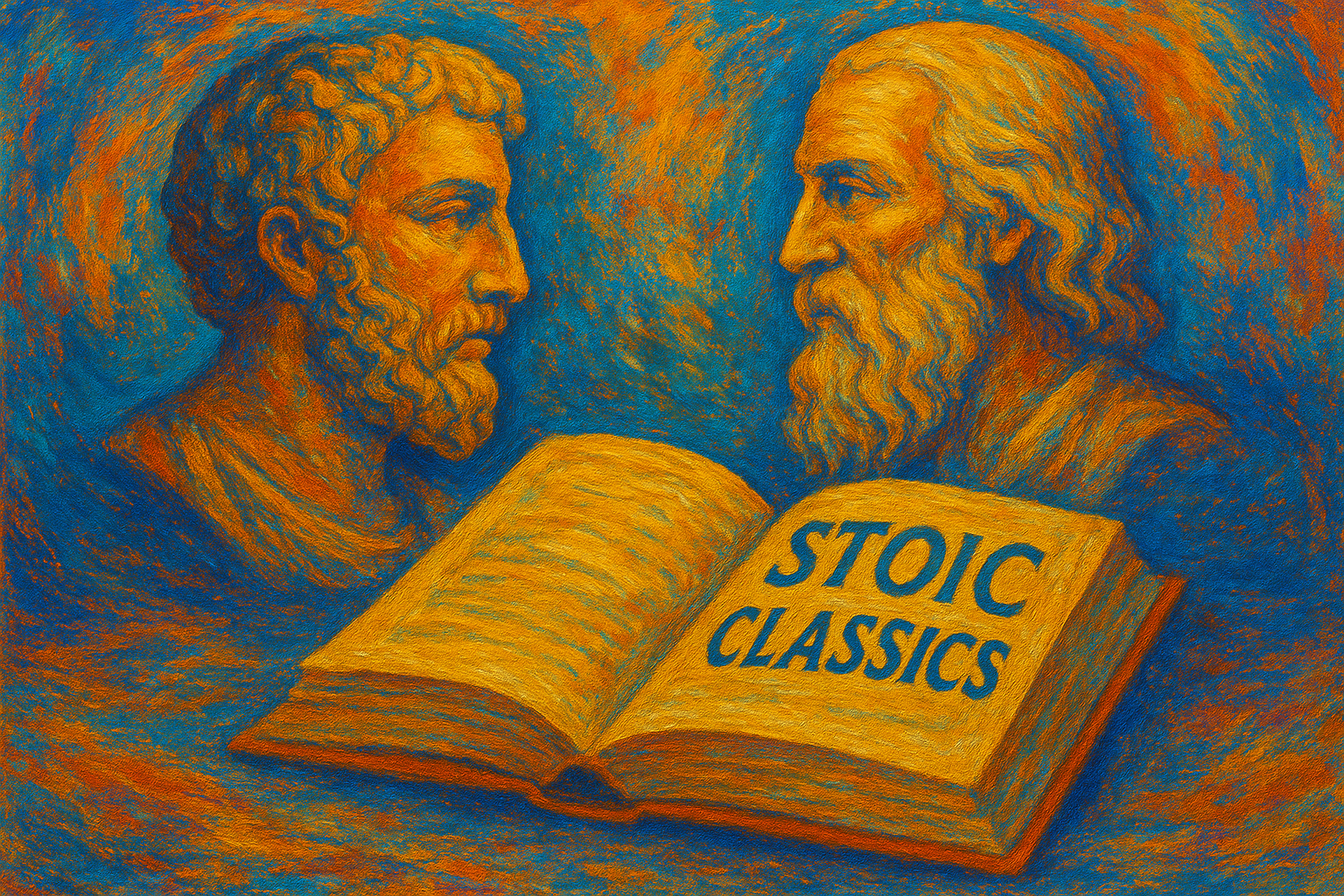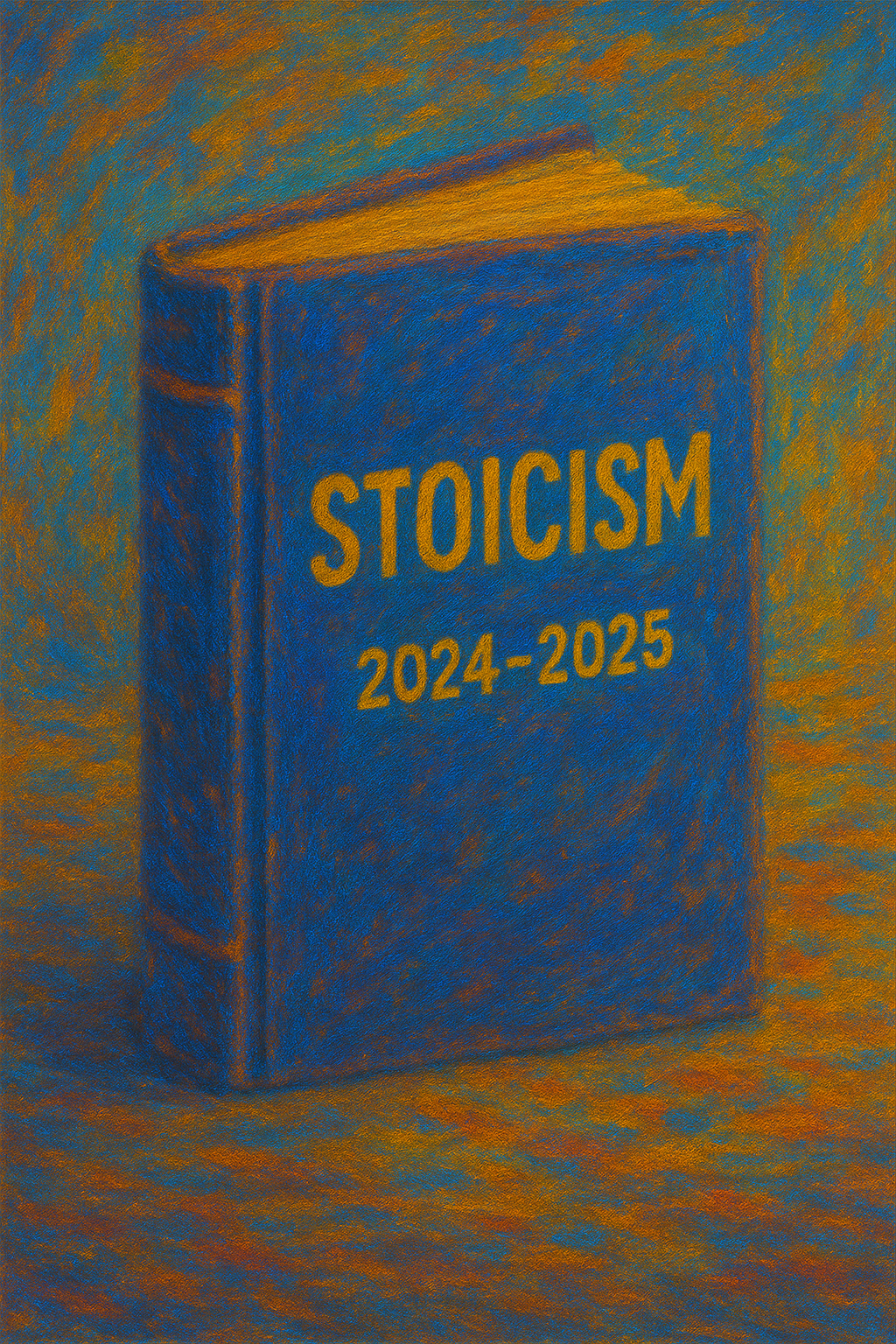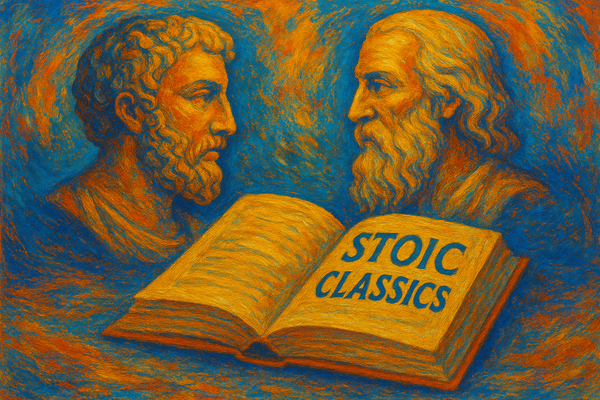The world has never been noisier and more chaotic than it is now. We are constantly bombarded with news alerts, our social media feeds are full to the brim with envy and amygdala hijacking announcements.
We are stressed at work, more and more demands piling on us every week. And it's no wonder that many of us are left craving meaning and a philosophy that can anchor us in these emotionally difficult and arguably toxic times.
And one particular philosophy of life that is having a surge of popularity is the philosophy of Stoicism.
For over 2,000 years, the philosophy of stoicism has helped people cultivate clarity, courage, inner freedom, and become the best kind of human they can be. The proponents of stoicism have included ancient emperors like Marcus Aurelius, right up until modern day entrepreneurs and thought leaders and general self-improvement fans who are looking to live a more meaningful life and deal with the demands and stresses that are burdened upon them. At the heart of Stoicism, there's a simple promise:
But there is one issue when it comes to learning about Stoicism. There are so many podcasts and articles and books available on this topic. Where should we start?
And this article that you're about to read is the solution to that problem.
Donald Robertson, who I've had the pleasure of interviewing over four, at least four times, is a psychotherapist and best-selling author of books like How to Think Like a Roman Emperor, How to Think Like Socrates, and The Art of Happiness. And today he finds himself as one of the most respected Stoic educators.
He spent decades studying, practicing, and teaching about every aspect of this philosophy. The fact that Donald has written books on Stoicism means that he's had to dive deep into the Stoic books that are available as part of his research. And Donald loves both the ancient esoteric works, and he will pay as much attention to these as the modern releases on Stoicism. So he is a fantastic person to help you not just learn about Stoicism, but to help you live it.
And so this guide specifically focuses on the books that are endorsed and reviewed by Donald Robertson. Going back all the way from the ancient texts up until the most recent 2025 releases.
And alongside each recommendation, you will see a quote directly from Donald Robertson in his words on why this book matters.
Think of this article as a reading compass, a path through 29 books that will help you embody Stoic wisdom so that you can start practicing it in everyday life.
Quick Recommendations by Reader Type
🔰 Complete Beginner? Start with:
- Meditations by Marcus Aurelius — the essential primary text
- How to Think Like a Roman Emperor by Donald Robertson — accessible modern guide
- The Daily Stoic by Ryan Holiday — bite-sized daily wisdom
📚 Want Academic Depth? Try:
- Stoicism: A Very Short Introduction by Brad Inwood
- Stoic Ethics: The Basics by Christopher Gill
- The Discourses by Epictetus (Oldfather translation)
💼 Applying Stoicism to Business/Leadership? Read:
- The Obstacle is the Way by Ryan Holiday
- Antifragile by Nassim Taleb
- Thoughts of a Philosophical Fighter Pilot by James Stockdale
😰 Dealing with Anxiety or Grief? Start with:
- Stoicism and the Art of Happiness by Donald Robertson
- Consolation Letters by Seneca
- How to be a Stoic by Massimo Pigliucci
🧘 Interested in Stoicism + Buddhism? Check out:
- More Than Happiness by Antonia Macaro
- Buddhism vs. Stoicism

Ancient Stoic Classics:
The Bedrock of Wisdom
Robertson often reminds students that before we can apply Stoicism, we must understand its roots. These are the texts the Roman Stoics themselves studied and lived by.
1. Meditations by Marcus Aurelius
"The Meditations is a very easy book to read but in my experience people do obtain much more from it when they study the text more closely, and learn a little more about the historical and philosophical context in which it was written."
2. The Handbook (Enchiridion) by Epictetus
"It’s an obvious choice because it’s short and easy to read. It was specifically designed by Arrian to provide a simple, practical introduction to Stoicism, almost like a bullet-point summary of the much longer Discourses."
3. The Discourses by Epictetus
"Marcus Aurelius also quotes repeatedly from The Discourses and he seems to be mainly following Epictetus’ brand of Stoicism. So if you like The Meditations, you’ll almost certainly like the Handbook as well. And if you like The Handbook, you’ll probably like the longer and more discursive version of the same ideas found in The Discourses."
4. Letters to Lucilius by Seneca
"Despite his murky political leanings, though, and pace Fronto, Seneca’s philosophical writings do contain a great deal of valuable Stoic wisdom. The Letters to Lucilius, of which there are 124, are the most common place for people to start."
5. Consolation Letters (to Marcia, Helvia, and Polybius) by Seneca
"If you like those, you should read Seneca’s other letters and essays, perhaps starting with the consolation letters to Marcia, Helvia, and Polybius. These are important examples of the consolatio genre in philosophical literature, in which philosophical advice is given to a friend in order to help them assuage emotional suffering. They illustrate, in other words, a form of Stoic psychotherapy or counselling."

Modern Stoicism
Bringing Ancient Tools Into Today’s World
What makes Stoicism powerful isn’t just its history—it’s that its lessons still work in boardrooms, classrooms, and living rooms today. These are the modern books Robertson highlights for applying Stoicism to real life.
6. The Daily Stoic: 366 Meditations on Wisdom, Perseverance, and the Art of Living by Ryan Holiday and Stephen Hanselman
"I found the new translations of the ancient texts very valuable, and especially the glossary of Stoic technical terms at the back of the book. The commentaries were also very readable and worthwhile, and include a wide range of literary and philosophical references. These undoubtedly help to make the Stoic texts appear more relevant and accessible to modern readers. [...] Most people will find this very-readable collection of Stoic sayings to be a great introduction to the philosophy."
7. The Practicing Stoic: A Philosophical User’s Manual by Ward Farnsworth
"Farnsworth concludes with a particularly valuable chapter called ‘Stoicism and its critics’ which cites important objections made against Stoicism by various authors. These are addressed by Farnsworth who thereby dispels several common misconceptions about Stoicism such as the idea that Stoics are cold-hearted, unemotional, or lacking compassion. [...] Those of you who have read some Stoicism books already will definitely find this a fresh take on things and newcomers to the subject will also enjoy it and find it very accessible."
8. How to be a Stoic: Using Ancient Philosophy to Live a Modern Life by Massimo Pigliucci
"The main part is divided into three sections. These deal respectively with training in mastering our desires and emotions, organizing our actions around a coherent moral goal, and learning to withhold our assent from initial misleading impressions. Pigliucci concludes by describing a list of a dozen Stoic exercises: [...] Indeed, some people might actually benefit from skipping to the end and reading this concluding section of the book first."
9. Stoicism and the Art of Happiness: Second Edition by Donald Robertson
"It’s a designed to teach people how to apply Stoic concepts and techniques in daily life by drawing comparisons with aspects of modern cognitive-behavioural therapy (CBT). [...] The book begins with a chapter on “the way of the Stoic”, explaining what’s meant by their fundamental slogan “Living in agreement with Nature”. It goes on to discuss Stoic ethics, the therapy of the passions, discipline of desire, Stoic teachings on love and friendship, action in Stoicism, the premeditation of adversity, discipline of judgement and Stoic mindfulness, and concludes with a chapter on Stoic cosmology and the contemplative practice known as the View from Above."
10. How to Think Like a Roman Emperor: The Stoic Philosophy of Marcus Aurelius by Donald Robertson
"The Stoics believed that we learn far more from role models than we do from lectures. I realized that one of the best ways to introduce people to Stoic ideas is through stories about real individuals who actually lived according to the philosophy. [...] How to Think Like a Roman Emperor weaves together the outer story of his life as emperor, based on the Roman histories, with the inner story of his philosophical and psychological journey, based on his own words in The Meditations."
11. Unshakeable Freedom by Chuck Chakrapani
"The first thing I wanted to say is that this book is probably one of the best introductions to Stoicism that I’ve read. I think it’s very well-written and very clearly explained the key concepts. The philosophy seems crystal clear and the use of examples from various famous philosophers and modern role models makes it engaging and easy to read."
12. More Than Happiness by Antonia Macaro
"I thought this was an excellent book and I’d recommend it to anyone interested in learning more about what Stoicism and Buddhism have to offer us today as guides to living. It was beautifully written and very clearly explained the key concepts. Overall, though, with those reservations in mind, I’d recommend this book. It’s very easy to read and I’m actually in agreement with much of what it says about both Stoicism and Buddhism."
13. The Obstacle is the Way by Ryan Holiday
"There’s plenty of good advice in The Obstacle is the Way; it’s an interesting and entertaining read. It will perhaps also inspire many people to study Stoicism in more depth and also to explore the range of psychological skills and strategies used by the Stoics to overcome such obstacles, and maintain their equanimity in the face of adversity. The most important thing about the book, though, is its message that a formula for turning obstacles into opportunities can be learned from the examples of these great (and in some cases not so great) men and women."
14. A Guide to the Good Life by William Irvine
"It’s a good book and one I frequently recommend to people who are new to the subject and interested in learning about Stoicism, but who lack a background in academic philosophy. It’s a book written in a very readable and accessible style and has many good ideas and interesting personal observations."
15. Stoicism: A Very Short Introduction by Brad Inwood
"First of all, I’d like to say that I recommend this book to anyone interested in learning about Stoicism. It’s a great little introduction. However, this is an authoritative introduction written by an academic philosopher and classicist specializing in the subject. Inwood gives a balanced overview of Stoic Ethics, Physics and Logic. Nevertheless, overall, I think most intelligent readers will follow this book and benefit from it as an introduction."
16. Thoughts of a Philosophical Fighter Pilot by James Stockdale
"Stockdale’s book is a fascinating blend of autobiography, philosophy, and military history, which explores how his study of Stoicism helped him to cope with the extreme adversity he faced as a POW. He describes how he turned to the works of the Stoic philosophers, particularly Epictetus, for guidance and inspiration. Stockdale’s account is both inspiring and thought-provoking, offering valuable insights into the practical application of Stoic principles in the face of extreme hardship. This book is highly recommended for anyone interested in Stoicism, leadership, or resilience. It’s particularly relevant to modern Stoicism because it provides a real-world example of how ancient Stoic teachings can be applied in contemporary contexts, such as military service or crisis situations."
17. Antifragile by Nassim Taleb
"Overall, I quite liked Antifragile. I do enjoy reading an author with a distinctive voice. His interpretation of Stoicism, though, is unusual and interesting. He’s got a lot to say, nevertheless, and he’s worth reading, and that’s probably what matters most at the end of the day. Taleb is quite into Stoicism, or at least Seneca’s Stoicism. Some people have even told me that they were introduced to Stoicism by reading his books."
18. Backbone by Karen Duffy
"It’s a book about developing a backbone, and a sense of humour, and not allowing chronic pain or illness to get you down. When I finally got round to it, I read it in a single evening and thoroughly enjoyed it. Duff’s pretty into Stoicism already, and maybe I’m biased, but I reckon she could be even more Stoic than she realizes. Her advice that pain is inevitable but suffering is optional is (you guessed it) also pure Stoic. The Stoics have given us a means of increasing our happiness by avoiding disturbance and embracing what they called ‘virtue’."
19. Happy by Derren Brown
"I wanted to write a quick review of Derren Brown’s recent book called Happy... because I think it’s very well written and worth reading. Stoic philosophy has obviously been a major influence on his own philosophy of life and it’s a theme that runs through most of the book. I thought the style of writing was very appealing and the author really finds a distinctive voice... This book is stuffed full of Brown’s musings about happiness and the meaning of life... In case you’ve forgotten, I said I liked this book and I’d recommend that you read it, especially if you’re interested in Stoicism."

Hidden Gems
Lesser-Known Stoic Texts
If you’ve read the classics, these overlooked works offer surprising new angles on Stoicism. Robertson highlights them as “bonus depth” for serious students.
20. The Philosophical Regimen by Antony, Earl of Shaftesbury
"If you love the writings of Marcus Aurelius, therefore, you should definitely read this book. It’s basically an early modern version of The Meditations. [...] His intimate knowledge of the original Greek texts means that The Philosophical Regimen also provides a great deal of insightful commentary on the surviving texts containing the thoughts of these two ancient Stoics."
21. The Eulogium on Marcus Aurelius by Antoine Léonard Thomas
"It’s a beautiful work of historical fiction. However, the author actually based it very faithfully on details of Marcus Aurelius’ life known from the surviving Roman histories. [...] It’s a fascinating read for anyone interested in Marcus Aurelius’ life, which it portrays very eloquently, connecting certain biographical events with aspects of his Stoic philosophy along the way."
22. Stoic Serenity: A Practical Course on Finding Inner Peace by Keith Seddon
"It’s based on a correspondence course [...] by an organisation called The Stoic Foundation. The book is based around set readings from Seneca and Marcus Aurelius. Each chapter concludes with some written exercises [...] It’s a very enjoyable book to read with a practical self-help focus, which makes it ideal for newcomers to the subject who are looking for guidance on applying Stoic ideas in daily life."
23. The Inner Discipline by Charles Baudouin and A. Lestchinsky
"Charles Baudouin, the main author, was one of the earliest writers in the field of modern psychotherapy to embrace concepts and techniques from Stoic philosophy. Indeed, a whole chapter is dedicated to the value of ancient Stoicism as an approach to self-help. [...] If you’re interested in the psychological applications of ancient philosophy, for therapy or self-improvement, it’s therefore worth reading The Inner Discipline even though it’s not entirely dedicated to Stoicism."

The Latest in Stoicism
2024–2025 Releases
Stoicism isn’t stuck in the past—it’s alive, with new books every year. Robertson has already spotlighted these recent contributions.
24. Right Thing, Right Now: Justice in an Unjust World by Ryan Holiday (2024)
"Overall, I liked the book and found it interesting and entertaining to read. I’d recommend it to anyone interested in Stoicism, self-improvement, or ethics in general. It’s a good introduction to the Stoic virtue of justice, illustrated with many historical examples."
25. Stoicism for Dummies by Tom Morris and Gregory Bassham (2024)
"Tom Morris, author of Stoicism for Dummies, provides an accessible entry point for beginners."
26. The Stoicism Workbook: How the Wisdom of Socrates Can Help You Build Resilience and Overcome Anything Life Throws at You by Scott Waltman, R. Trent Codd, and Kasey Pierce (2024)
"My wife, @Kasey__Pierce, co-authored this new book about #Stoicism and CBT, with Trent and Scott, two clinical psychologists, and I wrote this introduction for them about the relationship between Stoic philosophy and modern psychotherapy."
27. Stoic Ethics: The Basics by Christopher Gill and Brittany Polat (2024)
"New book on #Stoicism out today from Prof. Chris Gill and @brittanypolat." (Recommended by Robertson on his Amazon author page and X.)
2026 Update
28. The Stoicism Workbook by Scott Waltman, R. Trent Codd, and Kasey Pierce (2024)
"My wife, @Kasey__Pierce, co-authored this new book about Stoicism and CBT."
29. Right Thing, Right Now by Ryan Holiday (2024)
"A good introduction to the Stoic virtue of justice, illustrated with many historical examples."
Coming Soon (2025-2026)
We'll update this section as new Stoicism books are released. Subscribe to stay notified when we add new recommendations.
Final Thoughts: Why These Books Matter in 2025
The world isn’t getting calmer anytime soon. But Stoicism reminds us: we don’t need calmer seas—we need stronger pilots.
Donald Robertson’s recommended Stoicism books are more than just reading lists; they’re training manuals for life. Start with the classics to anchor yourself in timeless wisdom. Then branch into modern works that show how those same principles apply to career, love, loss, and leadership today.
Whichever book you choose first, approach it not just as a text to consume, but as a practice to embody.
As Seneca said:
“Sometimes even to live is an act of courage.”
Frequently Asked Questions About Stoicism Books
What is the best book to start learning Stoicism?
For most beginners, Meditations by Marcus Aurelius is the ideal starting point — it's the most accessible primary text. For a modern guide, How to Think Like a Roman Emperor by Donald Robertson combines Marcus's biography with practical exercises.
What is the best Stoic book for anxiety?
Stoicism and the Art of Happiness by Donald Robertson directly addresses anxiety using Stoic techniques and draws parallels with modern cognitive behavioral therapy (CBT). Seneca's Letters to Lucilius also contains timeless advice for managing worry.
Should I read Marcus Aurelius or Epictetus first?
Start with Marcus Aurelius's Meditations — it's more personal and immediately applicable. Then read Epictetus's Enchiridion (The Handbook) for the theoretical foundation that influenced Marcus. The Discourses can come later for deeper study.
What translation of Meditations is best?
For beginners: Gregory Hays (Modern Library) — clear, contemporary English
For study: Robin Hard (Oxford) — accurate with helpful notes
For beauty: George Long (classic) — traditional but sometimes archaic
Are Ryan Holiday's books good for learning Stoicism?
Ryan Holiday's books (The Daily Stoic, The Obstacle is the Way) are excellent introductions that make Stoicism accessible. For deeper understanding, pair them with primary texts and academic works like those by Donald Robertson or Massimo Pigliucci.
